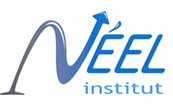- Accueil
- Institut Néel
- Équipes de recherche
- Pôles & Services techniques
- Travailler à l’institut
- Partenariats
- Actualités
- Agenda
- Annuaire
Lien visio : https://univ-grenoble-alpes-fr.zoom.us/j/95179072804?pwd=TzFtMEpIbkZBSXF0V0ZVc1NRMVZOUT09
Meeting ID: 951 7907 2804 | Passcode: 111
La présentation sera faite en anglais.
Extracting information about a physical system through measurement can lead to energy extraction at no apparent cost. Of course, it is now well known that a fair account of the energy exchanges must include the resetting of the memory state which stores this information. Overall, this solves the Maxwell demon paradox by showing its compatibility with Kelvin’s statement of the second: one cannot cyclically extract work from a single bath.
Since then, new insights have been obtained about the process of measuring a quantum system, such as regarding its fundamental work cost. As first pinpointed by Von Neumann, a quantum measurement can be divised into a correlation building step between the measured system and a meter system followed by a classical measurement of the meter. I will propose two figures of merit and a method for characterizing how energetically efficient different meter states can be at extracting information, and hence maybe help in the choice of implementation of such measurements.
Using this same measurement modelling, i will address another fundamental questions raised by measurement driven engines: where does the average energy provided by measurements come from ? Generalizing the example of such an engine, that we recently proposed, i will show this energy can be traced back to the one necessary to modulate the interaction between the system and meter. The conditions for this energy to be received in the form of work will also be discussed. Last but not least, choosing a position dependent interaction between the meter and system will allow the model to be autonomous and the cost of the modulation paid by the kinetic energy of the moving system;
